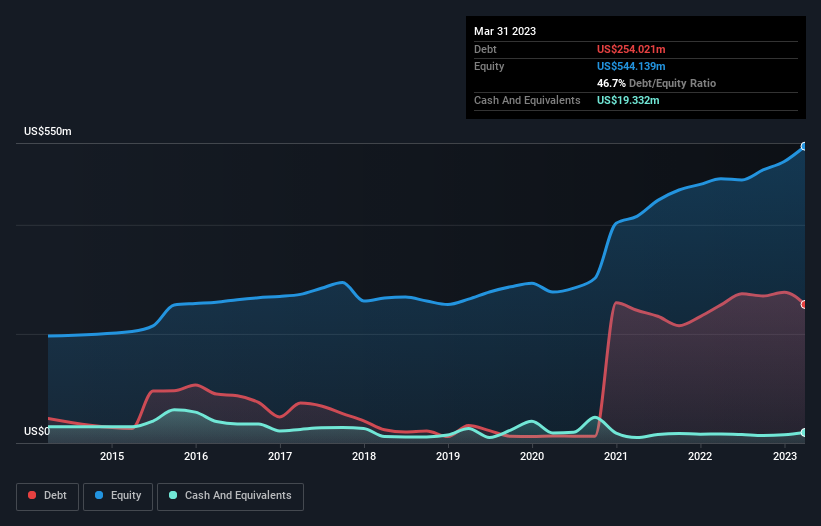- United States
- /
- Building
- /
- NasdaqGS:CSWI
Does CSW Industrials (NASDAQ:CSWI) Have A Healthy Balance Sheet?

Legendary fund manager Li Lu (who Charlie Munger backed) once said, 'The biggest investment risk is not the volatility of prices, but whether you will suffer a permanent loss of capital.' So it seems the smart money knows that debt - which is usually involved in bankruptcies - is a very important factor, when you assess how risky a company is. We note that CSW Industrials, Inc. (NASDAQ:CSWI) does have debt on its balance sheet. But the more important question is: how much risk is that debt creating?
When Is Debt Dangerous?
Debt is a tool to help businesses grow, but if a business is incapable of paying off its lenders, then it exists at their mercy. Part and parcel of capitalism is the process of 'creative destruction' where failed businesses are mercilessly liquidated by their bankers. However, a more usual (but still expensive) situation is where a company must dilute shareholders at a cheap share price simply to get debt under control. Having said that, the most common situation is where a company manages its debt reasonably well - and to its own advantage. When we examine debt levels, we first consider both cash and debt levels, together.
View our latest analysis for CSW Industrials
What Is CSW Industrials's Net Debt?
As you can see below, CSW Industrials had US$254.0m of debt, at March 2023, which is about the same as the year before. You can click the chart for greater detail. On the flip side, it has US$19.3m in cash leading to net debt of about US$234.7m.

How Strong Is CSW Industrials' Balance Sheet?
Zooming in on the latest balance sheet data, we can see that CSW Industrials had liabilities of US$108.0m due within 12 months and liabilities of US$391.3m due beyond that. On the other hand, it had cash of US$19.3m and US$124.1m worth of receivables due within a year. So its liabilities total US$355.9m more than the combination of its cash and short-term receivables.
Given CSW Industrials has a market capitalization of US$2.49b, it's hard to believe these liabilities pose much threat. But there are sufficient liabilities that we would certainly recommend shareholders continue to monitor the balance sheet, going forward.
We measure a company's debt load relative to its earnings power by looking at its net debt divided by its earnings before interest, tax, depreciation, and amortization (EBITDA) and by calculating how easily its earnings before interest and tax (EBIT) cover its interest expense (interest cover). Thus we consider debt relative to earnings both with and without depreciation and amortization expenses.
CSW Industrials has a low net debt to EBITDA ratio of only 1.3. And its EBIT easily covers its interest expense, being 10.5 times the size. So we're pretty relaxed about its super-conservative use of debt. On top of that, CSW Industrials grew its EBIT by 42% over the last twelve months, and that growth will make it easier to handle its debt. The balance sheet is clearly the area to focus on when you are analysing debt. But ultimately the future profitability of the business will decide if CSW Industrials can strengthen its balance sheet over time. So if you want to see what the professionals think, you might find this free report on analyst profit forecasts to be interesting.
But our final consideration is also important, because a company cannot pay debt with paper profits; it needs cold hard cash. So the logical step is to look at the proportion of that EBIT that is matched by actual free cash flow. Over the most recent three years, CSW Industrials recorded free cash flow worth 71% of its EBIT, which is around normal, given free cash flow excludes interest and tax. This cold hard cash means it can reduce its debt when it wants to.
Our View
The good news is that CSW Industrials's demonstrated ability to grow its EBIT delights us like a fluffy puppy does a toddler. And that's just the beginning of the good news since its interest cover is also very heartening. Looking at the bigger picture, we think CSW Industrials's use of debt seems quite reasonable and we're not concerned about it. After all, sensible leverage can boost returns on equity. There's no doubt that we learn most about debt from the balance sheet. However, not all investment risk resides within the balance sheet - far from it. For instance, we've identified 1 warning sign for CSW Industrials that you should be aware of.
Of course, if you're the type of investor who prefers buying stocks without the burden of debt, then don't hesitate to discover our exclusive list of net cash growth stocks, today.
New: AI Stock Screener & Alerts
Our new AI Stock Screener scans the market every day to uncover opportunities.
• Dividend Powerhouses (3%+ Yield)
• Undervalued Small Caps with Insider Buying
• High growth Tech and AI Companies
Or build your own from over 50 metrics.
Have feedback on this article? Concerned about the content? Get in touch with us directly. Alternatively, email editorial-team (at) simplywallst.com.
This article by Simply Wall St is general in nature. We provide commentary based on historical data and analyst forecasts only using an unbiased methodology and our articles are not intended to be financial advice. It does not constitute a recommendation to buy or sell any stock, and does not take account of your objectives, or your financial situation. We aim to bring you long-term focused analysis driven by fundamental data. Note that our analysis may not factor in the latest price-sensitive company announcements or qualitative material. Simply Wall St has no position in any stocks mentioned.
About NasdaqGS:CSWI
CSW Industrials
Operates as a diversified industrial company in the United States and internationally.
Flawless balance sheet with proven track record.

